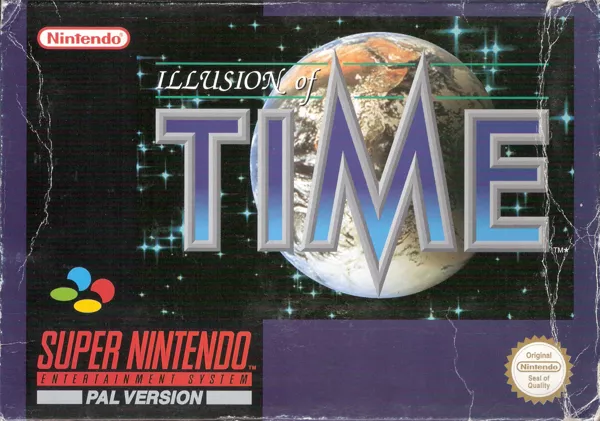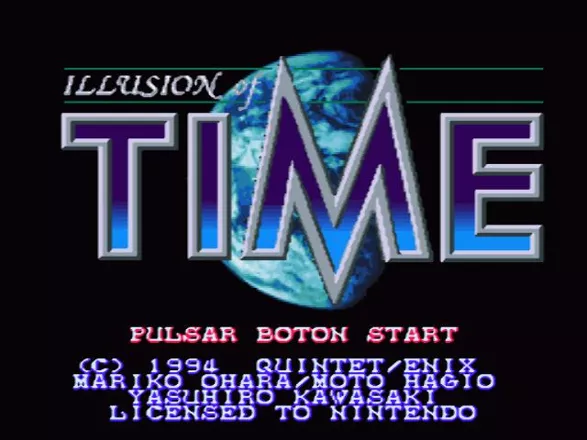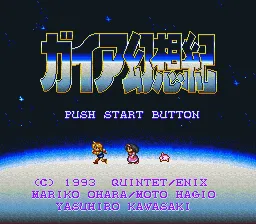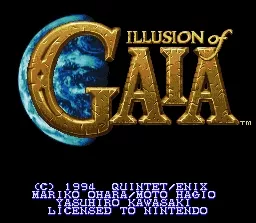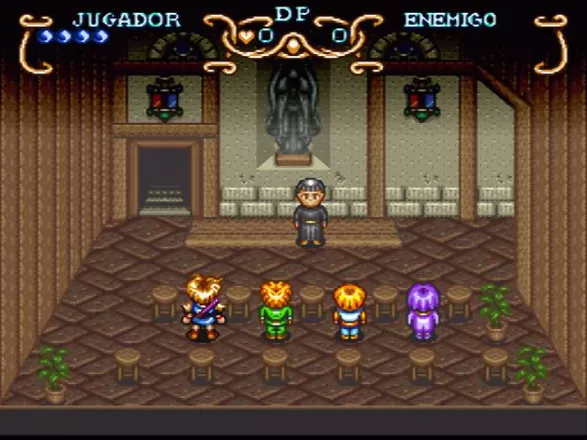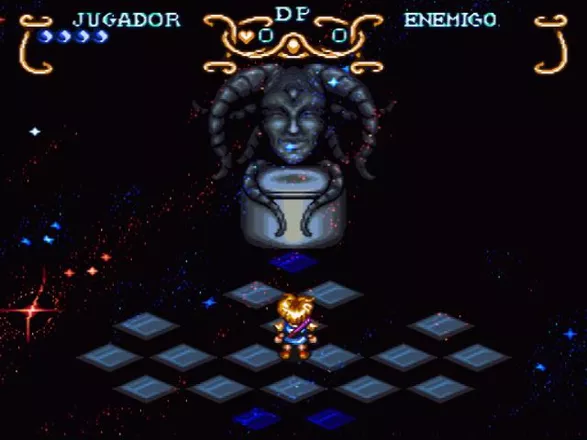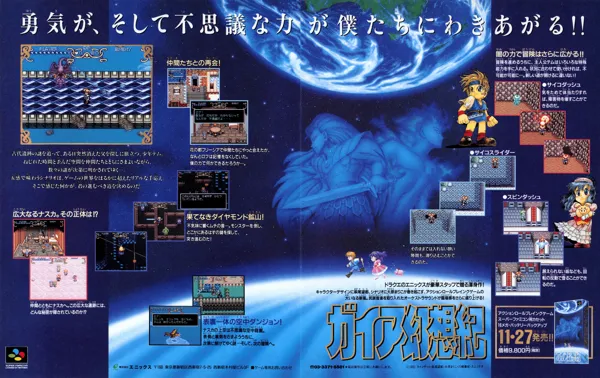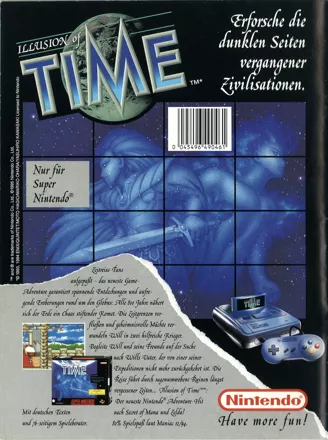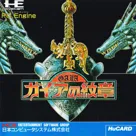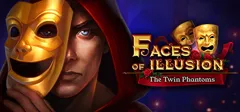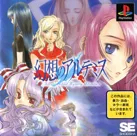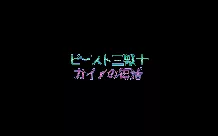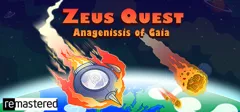Illusion of Gaia
Description official description
Will is a young boy whose father disappeared long time ago. Now Will lives in a small town with his grandparents. He possesses unusual abilities of pushing and pulling things without touching them. One day, he finds in his house a girl, who soon turns out to be the princess Kara. Kara's father, king Edward, wants her to marry a mysterious person called the Jackal. Kara asks Will to help her to escape the palace, and soon they both get involved in a string of mystery and conspiracies.
Illusion of Gaia is an action role-playing game set in a fantasy version of Earth reminiscent of the age of exploration (16th century) and featuring famous real-world locations such as the Egyptian pyramids, the Great Wall of China, etc. The player controls Will, who can either fight in his regular form or transform into any of the two alter egos: the dark knight Freedan and Shadow, a manifestation of energy. Each character has different attributes and fights with his own weapon. The player receives special jewels upon clearing a room of enemies, which acts like experience points and is used to improve the protagonist's attributes. There is no monetary system or equipment in the game.
Spellings
- ガイア幻想紀 - Japanese spelling
Groups +
Screenshots
Promos
Credits (SNES version)
62 People (49 developers, 13 thanks) · View all
| Original Story | |
| Character Designer | |
| Game Designer | |
| Program Director | |
| Main Programmer | |
| Background Designer | |
| Object Designer | |
| Graphic Designer | |
| Sound Composer | |
| English Text by | |
| French Text (Textes français) | |
| German Text |
|
| Text in Spanish by (Texto en español por) |
|
| Title Coordinator | |
| Quintet Staff | |
| [ full credits ] | |
Reviews
Critics
Average score: 81% (based on 23 ratings)
Players
Average score: 3.8 out of 5 (based on 56 ratings with 2 reviews)
A Classic in Every Sense of the Word...
The Good
EVERYTHING.
The Bad
NOTHING.
The Bottom Line
Same as Demon's Crest,this is a game that deserves more recognition. You are Will ( or Tim, depending on which version you're playing), a young boy with telekinetic powers. You embark on a quest to find out what exactly happened to your father during his expedition at the Tower of Babel. Along the way, you make friends and lose friends, journey to faraway places, battle various creatures of legend and fantasy, and uncover the secrets of lost civilizations. In the end, you and your powers are all that stand in the way of the Earth's total destruction-seriously, this game's story is EPIC. It still stands as one of my favorite games.
SNES · by Andrew Douglas (7) · 2006
Refreshingly streamlined, but saddled by its story.
The Good
In the early days, getting an RPG to crack the American console gaming market was a tough sell. Nintendo went all out on Dragon Warrior (née Quest) and wound up having to give away copies as a promo for Nintendo Power magazine. Despite getting an entire issue of said magazine devoted to it, Final Fantasy went on to have only modest success. Square continued to plug away at the problem by introducing starter RPGs that were intended to be more accessible, but nonetheless, fell short (see Final Fantasy Mystic Quest and Secret of Evermore). Enix’s offering (developed by Quintet) in that vein is Illusion of Gaia, the second game in the Soul Blazer trilogy.
Illusion of Gaia tells the story of Will, a young man from a small village with rare mental powers who survived a fatal expedition many years ago. One day his powers cause him to enter a place between worlds called “Dark Space”, where he receives ill tidings from Gaia, the Earth goddess, who warns him of an approaching comet. He must rescue the princess Kara from an assassination plot and discover the fate of his long lost father. The result is a globe-trekking journey to many of the most famous landmarks and legends of the ancient world, including Atlantis, the Great Wall, and the Great Pyramid to collect Mystic Statues. Along the way, Will uncovers the hidden truth about himself, his world, and what must be done to set things right.
As an action-RPG, Gaia’s gameplay is more reminiscent of the Legend of Zelda than Secret of Mana. Will can run, jump (with the aide of ramps), push, and pull. There is a strong emphasis on puzzle solving. The combat is straightforward hack’n’slash, but visceral and highly satisfying. The heart of this game is dungeoneering. The towns and world map serve as mere window dressing to tackling the game’s many labyrinths. The plot unfolds largely in between forays into the dark depths. Unlike the Legend of Zelda games, though, there isn’t much reward for exploring. There is only one special surprise that can be unlocked by finding all of the game’s Red Jewels, secret items hidden throughout the game world. Instead, you focus on attacking the varied locations and there myriad designs. Each dungeon has a unique look and feel and each requires different strategies to tackle. I particularly enjoyed the Sky Garden with its flipped world design, the Great Wall, which features a lot of jumping down through multiple floors to reach new areas, and was impressed by the unique visual appeal of the Mountain Temple.
Rather than dumbing itself down like FFMQ did, Gaia takes a streamlined approach to the RPG experience. There is no party despite the large supporting cast. Instead, Will can change form into two stronger beings with different abilities, Freedan the Dark Night, and Shadow, the blue flame-creature, at specific times. There are no weapons or armor in the game. Instead of gaining levels, whenever you clear out all of the enemies in a given dungeon chamber, you automatically receive a predetermined boost to one of your stats. Enemies don’t respawn when killed, either, which is a blessing when you have to backtrack. There is no magic system, although there are a number of special moves that Will and his alter egos acquire throughout the journey. Often times you’ll need to change forms or gain one of these abilities in order to access a new section of a dungeon. All of these design decisions lead the game to being more instantly accessible, especially to a gaming public who, at the time, would have been more accustomed to side scrolling platformers, beat’em-ups, and fighting games. Nonetheless, even without the more baroque embellishments of the genre, Gaia retains its essential RPG-ness.
The visuals in Gaia are among the best Enix and Quintet ever brought to the SNES. The video mode utilizes a larger than normal sprite size for an SNES RPG. The typical ¾ top down perspective is eschewed in favor of a vantage point that is closer to that of a brawler like Double Dragon. The result is highly detailed, well animated characters. For instance, Will’s hair will flicker in a breeze or Freedan’s cape flutters as he dashes. The scale is not limited to our hero, either. Venues such as the Hanging (Sky) Garden and the Nazca lines beneath it are appropriately massive. Mammoth enemies and gargantuan bosses dwarf Will, but less so his alter egos. The graphics are only enriched by the vibrant and diverse palette. Deserts are tinted with dry browns and mustard yellows. Ruins are shale and gray, over grown in lush greens. Water bursts with shimmering blues and foaming whites. Dark Space is haunted by twinkling stars and respiring, purple pulsars. It’s a pleasure and privilege to view.<br><br>**The Bad**<br>As with any JRPG, the storyline is a crucial part of the experience with Illusion of Gaia. While I’ve repeatedly seen the story praised in the annals of game magazines and fan sites, I profess to being supremely disappointed with the story here. While it may have seemed epic and fantastic in 1993, the tale told by Gaia is just plain bad. I can applaud Quintet’s developers for their willingness to attempt a mature and complex narrative (especially compared to the See Spot Run efforts that accompanied Square’s starter RPGs), but their literary style can be summed up simply as ‘leave no trope unturned.’ Will is the voiceless hero with no discernable personality. Princess Kara is slightly feisty, yet vulnerable. Lance is the loyal friend and sidekick. Seth is the troubled nerd. Erik is the overly confident youngster. There’s an evil assassin. There’s an eccentric inventor/uncle. There’s an existential threat to all life on Earth. There’s even a body snatcher plot. It’s all well-worn territory leaving little to discover. The only really interesting point is that there is a vibrant slave trade going on in the world and it figures heavily in the plot. That said, they censored every instance of the word ‘slave’ as ‘servant’. This severely undermines the plight of the characters in the game and, although Nintendo was probably trying to avoid controversy and offending anyone, I think it a lot of ways, dancing around the issue is MORE offensive. I get removing nudity or softening profanity, but why make less of the evil that is clearly going on the game world? Euphemizing evil acts is a way normalizing such behavior. If Nintendo and Quintet really thought that Americans couldn’t handle that aspect of the game, I think it would have been better left un-translated and unreleased. References to cannibalism were also covered up, but that’s much more forgivable.
As aforementioned, the narrative elements are set in between the dungeons. I don’t have a problem with this structure, but the plot points have the annoying habit of taking the form of cut scenes or, worse yet, areas where you’re fenced in until you talk to all of the right people in the right order. There is a particularly egregious example of this in a section where Will and Kara are marooned on the jetsam of a ship and spend a month out at sea. The whole scene takes maybe 10 or 15 real time minutes to play out where you can’t really do anything productive. Although this may make for a good simulation of being lost at sea, it doesn’t make for good gameplay.
Though it may not be fair to consider this a bad element, another effect of the streamlining process is that the game is basically devoid of any exploration. The world map simply branches from one location to the next, and often times you don’t even get that much of a choice as to where to go. There are the aforementioned hidden Red Jewels that can be collected, but their hidden locations can often be rather obtuse and, worse yet, as the story advances whole portions of the map will be rendered completely inaccessible for the rest of the game, so if you miss a Jewel, you can never go back and find it. Of course, there is no warning about this in the game, nor is there much of an explanation of the Jewels’ value, so by the time you discover what they’re all about, it may be too late.
A number of Gaia’s puzzles are equally obtuse. For instance, when running on a ramp and jumping it’s possible to reverse mid-jump and come to a stop, but you’re never really clued into this fact, and if you don’t discover it by accident like I did, you can waste hours running around in a dungeon where all of the monsters are dead and there’s nothing else left to interact with. Sometimes when the solution to a puzzle is seemingly obvious, such as an area with a caged in monster that Will doesn’t have the reach to hit, but Freedan does, you can come back and do the right thing only to get frustrated by finding out that you have to stand in one exact spot in order to hit what you’re aiming for, or that you have to not only walk over an odd looking spot on the floor, but must stand there for half a minute to trigger an event. That’s not to say that all of the puzzle design is poor, but there are enough of these ‘what the hell’ kind of moments that you can get pulled out of the moment. Anytime a player gets so fed up that they reach for a walkthrough, that has to be considered a failure of design.
While I can appreciate Gaia for trying to eliminate grinding at a time when it was still commonly necessary in a number of RPGs, their version of leveling up comes with its own unintended consequences. As with the Red Jewels problem, if you miss an enemy in a dungeon, you may miss out on a stat increase irrevocably. This isn’t an issue for the most part because often times you’ll have to kill all of the enemies in a room or area to open up a door or some other egress, but this can be equally annoying in very large dungeons where a foe may be tucked away somewhere from the rest of his brethren.
Aurally, Illusion of Gaia first and foremost does no harm. That’s not to say that the music is bland, quite the opposite. The tunes accompanying the dungeons are appropriately epic, while the music for each town is a soothing melody. Still, there’s nothing really memorable about the soundtrack. One score is replaceable by the next. There’s no sense of place that binds a theme to its location. There’re just two audio modes: in a town or in a dungeon. The sound effects are similarly effective, but lack distinction.<br><br>**The Bottom Line**<br> Despite its many faults, including a narrative that I absolutely hate, I can still recommend Illusion of Gaia. There is enough good gameplay and occasional delight to overlook the warts. The dungeons are fun and clever for the most part. The game is fairly easy, save some of those irritating moments, yet avoids feeling dumbed down. If you want the best experience, though, I’d play this one with a guide. If for no other reason, do so because you’ll drive yourself insane trying to get all of the Red Jewels otherwise.
SNES · by Nancy "Infested" Kerrigan (36) · 2013
Trivia
References
Collecting all 50 Red Gems opens up a special level, the boss of which is a much harder version of Solid Arm, the first boss of Soul Blazer, Illusion of Gaia's predecessor. In fact, when defeated, he says "Blazer was strong, but you are stronger".
Awards
- GameFan
- 1994 (Vol 3, Iss. 1) - Overall Action/RPG Game of the Year
- 1994 (Vol 3, Iss. 1) - Best SNES Action/RPG Game of the Year
Information also contributed by Big John WV
Analytics
Related Sites +
-
Illusion of Gaia
article in the open encyclopedia about the game
Identifiers +
Contribute
Are you familiar with this game? Help document and preserve this entry in video game history! If your contribution is approved, you will earn points and be credited as a contributor.
Contributors to this Entry
Game added by Unicorn Lynx.
Additional contributors: nullnullnull, Shoddyan, monkeyislandgirl, John Wallace, danowar, Patrick Bregger, Rik Hideto.
Game added July 27, 2002. Last modified July 25, 2024.


